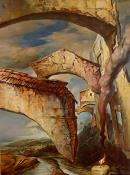|
Howard Sklar, PhD |
|
University Lecturer Department of Modern Languages (English Philology) University of Helsinki
Title of Docent in Literary Studies, with a Special Emphasis in Narrative Theory (University of Tampere) |
|
Fiction and the Emotions (2009) |
|
Course Description
In recent years, scholars in literary studies and aesthetics have taken a renewed interest in the relation between fiction and the emotions. This course will address some of the central questions that have been raised, including:
· The representation of the emotions of characters in fiction · Readers’ experiences of emotion in response to works of fiction · Distinctions and similarities between “real” and “aesthetic” emotions · Narrative techniques that elicit emotions in readers · Types of emotions that readers experience in response to works of fiction, including empathy, sympathy and fear · Empirical approaches to the study of reader emotions
We will examine each of these issues, both from a theoretical perspective and in terms of specific works of fiction.
Course Requirements:
· Regular attendance · Assigned readings · One short paper (4-5 pages) on a particular theoretical approach to the aesthetics of emotions in fiction · One short paper (4-5 pages) analyzing a fictional text in terms of its emotional content · Active participation in discussions
Primary Theoretical Sources (subject to change)
· Selections from Emotion and the Arts (Hjort and Laver, eds., 1997) · Selection from Empathy and the Novel (Keen 2007) · “Fearing Fictions” (Walton 1978) · Selection from Paradoxes of Emotion and Fiction (Yanal 1999) · Selection(s) from Sympathy and Joyce’s Dubliners: Ethical Probing of Reading, Narrative, and Textuality (Vesala-Varttala 1999) · Selection(s) from The Art of Sympathy: Forms of Moral and Emotional Persuasion in Fiction (Sklar 2008, doctoral dissertation) · “Shifting Perspectives: Readers’ Feelings and Literary Response (Miall/Kuiken 2001)
The fictional works to be used in this course (mainly short fiction, but also excerpts from novels) will be announced during the first session. |
